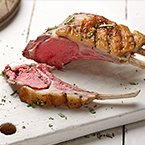The days are getting lighter and we are feeling brighter! Thanks to an inspiring trip to the Oxford Real Farming Conference in the first week of January where we listened to the viewpoints of many different speakers, from academics and policy drivers to farmers and philosophers.
We were feeling pretty gloomy last year about what lies ahead for livestock farmers in the UK with all the uncertainties thrown up by Brexit and the different direction the world is going in, but we now have the opportunity to make changes for the better and create a healthy, sustainable food economy in this country.
We know that the current system needs sorting out, but life outside of the European market is a scary prospect. Although large businesses get a disproportionate share of the subsidies, most livestock farmers in the uplands and truly rural areas will struggle to survive without these payments, including us, so a support system must be put in place. We’re hugely concerned that the politicians will ‘sell out’ on agriculture in their negotiations, and farm produce, such as lamb, will be difficult to export and we’ll be flooded with cheap imports. Free trade deals (such as TTIP) could allow the import of substandard food, and it’s alarming to think that we could have meat produced to lower welfare standards than we allow here or American beef with growth hormones sitting on the supermarket shelves soon. Most of all we don’t want all the rules and regulations which protect our environment thrown out in the bonfire of red tape, and the door open to GM crops and continued use of glyphosate and neonicotinoids.
So what’s there to be excited about? There were 800 people attending the ‘alternative’ Oxford Real Farming Conference, probably double the number that was at the ‘establishment’ Oxford Farming Conference taking place at the same time just down the road. It was well reported on Radio 4's Farming Today Program. The facts are clear, that there are only 100 harvests left in our soils, that antibiotics can’t continue to be overused, that the nutritional quality of food produced from industrial intensive agriculture is measurably less than in the food that we grew before this era and from organic systems. But this can change. Now is the chance to put this right or as the ‘Brexiteers’ said, ‘to take back control’. The amazing energy at the conference, particularly from the younger generation, the passion about making a living from sustainable rural businesses, ethical food systems and organic growing makes me think it is possible.
It took me back to the time when we first started farming in 1985, with a blank canvas, but following a way of farming which we believed was right, going organic, which was fairly radical at that time. Back then there was no market for organic meat and we were very much on our own. It feels like we are at the same place now in a way, looking to the future and not knowing what it holds for farming. So we will have to trust our instincts and go with what feels right and what makes sense to us. Let’s make the big decisions on ethical, sustainable and environmental grounds rather than just about profit! The way forward is not more of the production paradigm; it’s about feeding ourselves well.





